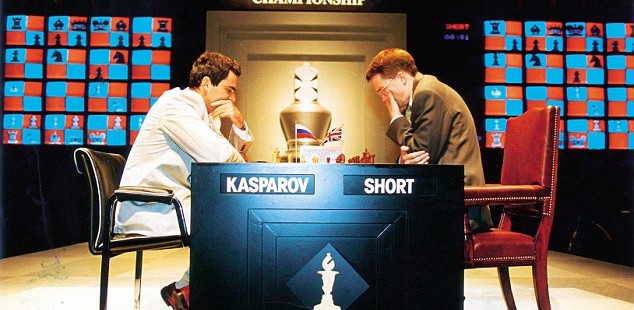

Nigel Short began his chess career as a bona fide prodigy. He defeated Korchnoi in a simul at the age of 10. In 1977 at the age of 12 he became by far the youngest ever participant in the British Chess Championship. When Nigel was 14, he became British Champion (tied with John Nunn).
During the FIDE candidates matches, when Garry Kasparov was asked who the challenger would likely be, he made the glib answer: “It will be Short and it will be short!” As predicted, Short earned the right to play Kasparov, by beating Speelman 5½ to 4½, Gelfand 5 to 3, Karpov 6 to 4 and Timman 7½ to 5½.
Unhappy with the bidding process to select the site for the match, FIDE’s lack of consultation with the players, and the 20% cut of the prize fund going to FIDE, Kasparov and Short made the historic decision to play the title match outside of FIDE’s jurisdiction. A new organization called the PCA (Professional Chess Association) was formed for the marketing and organization of the championship match. FIDE reacted by stripping Kasparov of his title and holding its own championship match, Karpov-Timman 1993, to be played concurrent with the Kasparov-Short match.
The Times of London newspaper sponsored the event, dubbing it “The Times World Chess Championship.” It was played in the heart of London at the Savoy Theater, a short distance from Trafalgar Square and across the street from Simpson’s-on-the-Strand, a famous chess center during the mid-1800s. It was estimated that as many as one million viewers watched the first few games on television.[1]
The match was itself was a lopsided victory for Kasparov. The match started tragically for Short, who lost on time in a superior position. Although the games were very hard fought and exciting, Kasparov opened up a big early lead and won comfortably.
With a final score of 12½ to 7½, Garry Kasparov became the PCA Chess Champion–however, he was recognised by the world as the one true World Chess Champion.
Kasparov vs Short, 1993
London, England

